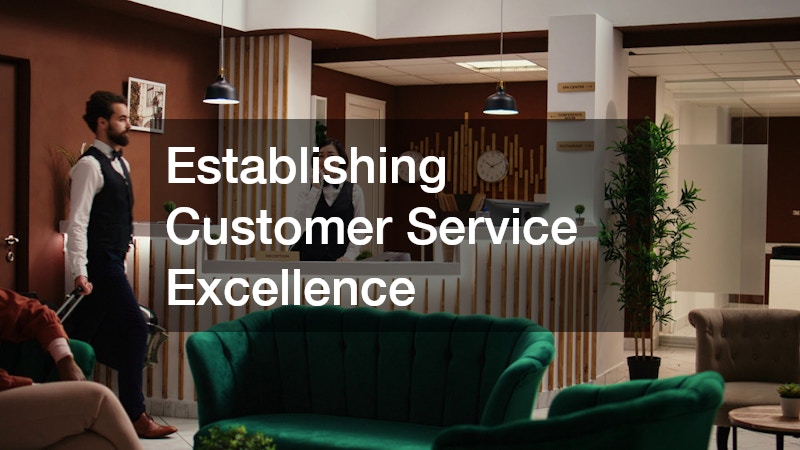Running a small inn or motel can be a rewarding venture for individuals with a passion for hospitality and a strong entrepreneurial spirit. Unlike large hotels, small inns offer personalized experiences, creating a sense of warmth and connection that guests remember. However, the success of such a venture requires careful planning, strategic marketing, and efficient day-to-day management. From selecting the perfect location to ensuring operational efficiency and guest satisfaction, this guide provides comprehensive insights for running a thriving inn or motel. Along the way, we will also explore essential services and contractors that can help your business operate smoothly, from document shredding services to plumbing and elevator repair service.
How to Choose the Right Location for Your Inn or Motel

Assessing Market Demand
The first step in establishing a successful inn or motel is to evaluate market demand. Conduct thorough research to understand the types of travelers visiting the area, whether they are tourists, business professionals, or seasonal visitors. High-traffic areas near tourist attractions, airports, or business hubs can provide a consistent flow of guests. By analyzing visitor patterns and occupancy rates of nearby accommodations, you can identify gaps in the market that your inn or motel can fill. A clear understanding of market demand ensures that your property will attract consistent bookings.
Understanding Zoning Regulations
Before purchasing or leasing a property, it’s critical to understand zoning regulations. These laws dictate what types of businesses can operate in specific areas. Consulting with local authorities helps ensure compliance with municipal codes, avoiding costly legal issues. Properly zoned properties also allow for future expansion or renovation projects, such as adding new rooms or installing amenities that enhance guest experiences.
Considering Accessibility and Visibility
Accessibility and visibility are crucial factors in choosing a location. Guests prefer accommodations that are easy to reach via major roads or highways, and signage that clearly identifies your property increases its visibility. High-traffic locations may also offer additional opportunities for marketing and spontaneous bookings, though noise and traffic flow should be considered to maintain a pleasant guest environment.
Analyzing Competition in the Vicinity
Understanding local competition allows you to differentiate your inn or motel. Research nearby hotels and motels, their pricing structures, amenities, and guest reviews. This information helps position your property with unique offerings, such as personalized services, complimentary amenities, or specialized accommodations. By providing a distinct experience, you can attract guests who are seeking more than just a place to sleep.
Evaluating Local Demographics
Local demographics play a significant role in shaping your inn’s offerings. Knowing the age, income level, and travel habits of potential guests helps tailor rooms, services, and pricing strategies. For example, areas frequented by families might benefit from larger suites, kid-friendly features, or safe outdoor spaces. Meanwhile, business travelers may value high-speed internet, on-site meeting spaces, and convenient check-in options. Aligning your property with the needs of the local demographic ensures higher occupancy and guest satisfaction.
Developing a Business Plan
Outlining Your Business Objectives
A clear business plan establishes the foundation for a successful inn or motel. Define your mission, vision, and short-term and long-term objectives. Determine whether your focus will be on budget accommodations, boutique experiences, or luxury services. This clarity guides every business decision, from hiring staff to marketing strategies, ensuring your operations remain consistent with your goals.
Financial Planning and Budgeting
Financial planning is essential for the success of any hospitality business. Accurately calculate start-up costs, including property acquisition, renovations, furnishings, and essential services such as elevator repair service or commercial laundry services. Factor in ongoing operational expenses such as utilities, staff salaries, and maintenance. Budgeting carefully prevents cash flow issues and allows for strategic investments in services that enhance guest satisfaction. Small business start-up loans can provide the initial capital needed to cover these costs, offering a financial cushion during the early stages of operation.
Identifying Your Target Market
Understanding your ideal guests helps in designing your services, rooms, and marketing campaigns. Decide whether your primary focus will be on families, business travelers, solo adventurers, or long-term stays. Knowing your target market allows you to tailor amenities and services, such as commercial door service for enhanced safety or specialized laundry solutions, to meet specific needs. A well-defined target market increases occupancy rates and encourages repeat visits.
Creating a Marketing Strategy
A robust marketing strategy is essential for attracting and retaining guests. Develop a professional website, maintain active social media profiles, and partner with travel websites to reach potential visitors. Highlight the unique features of your inn, including comfortable accommodations, personalized service, and amenities such as fencing services for outdoor spaces or quality painting contractors who maintain an appealing aesthetic. Effective marketing ensures your inn stands out in a competitive market.
Setting Goals and Milestones
Setting realistic goals and milestones helps monitor progress and keep your business on track. These goals can range from achieving specific occupancy rates to launching seasonal promotions or introducing new services. Regularly reviewing and adjusting your objectives ensures your inn or motel continues to grow sustainably, adapting to market trends and guest preferences.
Legal Requirements and Licensing

Understanding Permit and Licensing Requirements
Operating a small inn or motel requires multiple permits and licenses, including business registration, fire safety compliance, and health department approvals. Failure to obtain the necessary documentation can result in fines or closures. Working with professionals familiar with local regulations ensures your business meets all legal requirements from the start.
Knowledge of Health and Safety Standards
Maintaining health and safety standards is critical for guest trust and business compliance. Regular inspections of fire safety equipment, elevators, and general building maintenance protect both guests and staff. Engaging reliable elevator repair service professionals and adhering to sanitation protocols for commercial laundry services reduces risk and enhances the guest experience.
Insurance Needs and Liability Coverage
Comprehensive insurance coverage protects your inn or motel from unforeseen events. Policies may include property insurance, general liability, workers’ compensation, and coverage for specialty services such as plumbing issues or elevator malfunctions. Insurance mitigates risk and ensures continuity in case of emergencies.
Tax Obligations and Financial Record Keeping
Meticulous financial record keeping is essential for tax compliance and efficient business management. Maintain accurate records of revenue, expenses, payroll, and services such as document shredding services for secure disposal of sensitive financial information. Using accounting software or working with a professional accountant can simplify these tasks and prevent costly errors.
Employment Law and Hiring Practices
Complying with employment laws protects both your business and your staff. Ensure fair hiring practices, contracts, and compensation structures align with local labor regulations. Proper training of employees in guest services, housekeeping, and maintenance ensures that your staff represents the inn professionally and provides a high-quality guest experience.
Designing Guest Rooms and Common Areas
Choosing Comfortable Furnishings
Guest comfort is the cornerstone of repeat business. Invest in high-quality beds, bedding, and seating, ensuring that every room provides a restful and enjoyable stay. In common areas, consider durable furnishings that accommodate multiple guests, balancing comfort with practicality.
Incorporating Aesthetic Design
A visually appealing property enhances the guest experience and contributes to positive reviews. Work with painting contractors to create inviting interiors, choose color schemes that reflect your brand, and ensure the exterior is well-maintained. Attractive design elements can transform a simple motel into a memorable destination.
Ensuring Accessibility for All Guests
Accessibility is an essential consideration. Install ramps, wide doorways, and elevators, and ensure that bathrooms meet accessibility standards. Utilizing professional elevator repair service providers ensures safety and reliability for guests with mobility needs, creating an inclusive environment that appeals to a broader audience.
Maintaining Quality Standards
Consistency in cleanliness, maintenance, and service quality is key to building a strong reputation. Routine inspections, staff training, and preventive maintenance for plumbing, doors, and other critical systems maintain operational excellence. Engaging reliable commercial laundry services ensures linens and towels are always fresh and sanitary.
Planning for Future Renovations and Upgrades
Anticipating future growth and renovations helps your inn remain competitive. Budget for upgrades to flooring, furniture, or fencing services for outdoor spaces. Planning ahead allows you to implement improvements with minimal disruption to guests and operations.
How to Market Your Inn or Motel Effectively
Creating an Online Presence
A strong digital presence is crucial in today’s travel market. Develop a user-friendly website with booking capabilities, detailed property descriptions, and high-quality images. Highlight services such as commercial laundry services, elevator reliability, and safety enhancements like commercial door service to attract informed guests.
Utilizing Social Media Platforms
Social media provides opportunities to engage directly with potential guests. Post updates about seasonal promotions, special events, or property enhancements. Sharing behind-the-scenes glimpses of day-to-day operations, like staff maintaining landscaping or painting contractors refreshing interiors, fosters a personal connection with your audience.
Engaging in Local Community Events
Participation in local events raises visibility and strengthens community ties. Sponsorships, open houses, or collaboration with local tourism boards help your inn become a recognized part of the area. Local engagement often translates to positive word-of-mouth recommendations from community members.
Partnering with Travel Websites
Listing your inn or motel on travel booking platforms expands your reach to national and international travelers. Highlight amenities such as reliable plumbing services, commercial laundry facilities, and well-maintained elevators to attract discerning guests. Positive reviews and professional photos increase credibility and bookings.
Offering Promotional Discounts and Packages
Promotional packages entice guests and encourage longer stays. Consider seasonal deals, family-friendly bundles, or business traveler specials that emphasize comfort, convenience, and quality services. Combining offerings such as secure commercial door service or document shredding services for corporate clients adds value and differentiates your property.
Establishing Customer Service Excellence

Training Staff in Hospitality Standards
Well-trained staff form the backbone of any successful inn. Provide training in guest communication, problem resolution, and operational protocols. Staff knowledgeable about services like commercial laundry operations, elevator safety, and plumbing maintenance can address issues promptly, enhancing guest satisfaction.
Implementing Feedback Systems
Guest feedback is invaluable for continuous improvement. Use surveys, online reviews, and direct communication to gather insights. Address concerns quickly, particularly those related to safety, cleanliness, or facility maintenance, to maintain a strong reputation.
Personalizing Guest Experiences
Personal touches create memorable experiences. Recognize returning guests, provide customized recommendations, and accommodate special requests whenever possible. Small gestures, such as ensuring well-maintained fencing services around outdoor spaces or promptly addressing elevator issues, signal attention to detail.
Handling Complaints and Issues Effectively
A proactive approach to complaints builds trust. Establish clear protocols for resolving guest issues, including plumbing problems, elevator malfunctions, or room maintenance requests. Quick, professional responses turn potential negatives into opportunities for positive impressions.
Providing Extra Amenities and Services
Additional amenities can differentiate your property. Consider services like document shredding for business travelers, access to commercial laundry facilities, or well-maintained common areas. These extras contribute to guest satisfaction and can encourage repeat visits.
Managing Day-to-Day Operations
Developing Standard Operating Procedures
Standard operating procedures (SOPs) ensure consistency across operations. Document processes for housekeeping, maintenance, and guest interactions. SOPs can include schedules for elevator inspections, plumbing checks, or routine painting contractor services, ensuring a seamless guest experience.
Inventory and Supply Chain Management
Effective inventory management prevents shortages and operational disruptions. Keep track of linens, cleaning supplies, maintenance materials, and other essentials. Partnering with reliable contractors, such as concrete contractors for facility repairs or commercial laundry services for linens, ensures consistent quality.
Scheduling and Staff Management
Staff scheduling impacts both service quality and operational efficiency. Balance shifts to meet demand during high and low seasons. Properly trained personnel in housekeeping, maintenance, and front desk operations, including elevator and plumbing oversight, guarantee smooth day-to-day functioning.
Maintaining Cleanliness and Hygiene
Maintaining impeccable cleanliness is vital for guest satisfaction. Establish routines for room cleaning, common area upkeep, and sanitation of high-touch surfaces. Commercial laundry services ensure fresh linens and towels, while routine maintenance checks, including plumbing inspections, prevent disruptions.
Utilizing Technology for Efficiency
Technology can streamline operations. Property management systems, online booking platforms, and maintenance tracking software improve efficiency. Use these tools to monitor service requests, schedule maintenance, and manage inventory, ensuring your inn runs smoothly with minimal errors.
Seasonal Considerations and Planning
Preparing for High and Low Seasons
Understanding seasonal trends allows for effective planning. Adjust staffing, inventory, and marketing efforts to accommodate fluctuating occupancy. Ensure essential services like elevator repair, plumbing, and commercial laundry operations are prepared for peak demand.
Adjusting Pricing Strategies
Dynamic pricing strategies help maximize revenue. Increase rates during high-demand periods and offer discounts during slower seasons. Consider adding value through services like commercial door service or document shredding for business guests to encourage bookings during low occupancy periods.
Staffing Adjustments for Seasonal Demand
Flexible staffing models allow your inn to maintain service quality while controlling costs. Hire temporary or part-time employees during peak seasons and ensure core staff are cross-trained in housekeeping, maintenance, and guest services, including elevator and plumbing oversight.
Marketing Seasonal Offerings
Highlight seasonal promotions to attract guests. Special packages for holidays, local events, or tourist attractions can increase bookings. Emphasize convenience and quality amenities, such as commercial laundry services and reliable elevator systems, to create a compelling value proposition.
Handling Weather-Related Challenges
Weather events can impact operations and guest safety. Develop contingency plans for plumbing issues, power outages, or access problems. Reliable contractors, such as concrete contractors for repairs or fencing services for property protection, help mitigate damage and ensure safety.
Financial Management Best Practices

Monitoring Cash Flow
Regular cash flow monitoring is critical for sustainability. Track revenue from room bookings, additional services, and seasonal promotions. Timely management of expenses, including payments to contractors, plumbers, and commercial laundry services, ensures operational stability.
Budget Analysis and Review
Review your budget periodically to identify areas for cost savings and potential investment. Evaluate spending on maintenance, amenities, and marketing to ensure alignment with financial goals. Small business start-up loans may provide flexibility for strategic upgrades or expansions.
Utilizing Financial Software Tools
Financial software simplifies accounting, payroll, and expense tracking. Use these tools to manage vendor payments, such as elevator repair service providers or painting contractors, and track income to inform future budgeting decisions.
Cost-Cutting Strategies
Implement cost-saving measures without compromising quality. Optimize utility usage, negotiate vendor contracts, and schedule preventive maintenance to avoid expensive repairs. Efficient use of services like commercial laundry facilities can also reduce operational costs.
Securing Loans and Managing Debt
For expansion or renovation projects, securing loans can provide necessary capital. Small business start-up loans offer a viable option for funding property improvements, adding amenities, or investing in services like commercial roofing company expertise for roof upgrades. Proper debt management ensures long-term financial health.
Expansion Opportunities
Assessing Market Opportunities
Evaluating market opportunities helps identify potential for growth. Consider guest feedback, occupancy trends, and competitor analysis to determine whether expanding services or amenities will increase profitability. Adding features such as updated commercial door service or upgraded elevator systems can enhance appeal.
Diversifying Services Offered
Diversifying services creates additional revenue streams. Offer on-site laundry, business services like document shredding, or recreational amenities. High-quality contractors, including plumbers, painting contractors, and concrete contractors, can support these enhancements.
Collaborating with Other Businesses
Partnerships with local vendors and attractions expand your reach. Collaborate with tour operators, local restaurants, or event planners to create packages that attract guests. Reliable commercial roofing company services and fencing services for property enhancement also contribute to a professional image.
Exploring Franchise Options
Franchising can offer brand recognition and operational support. Evaluate the benefits of affiliating with a franchise network, including access to marketing resources and standardized procedures, while still maintaining personalized guest experiences.
Planning for Additional Locations
Expansion to multiple locations requires careful planning. Conduct thorough market research, ensure financial readiness, and maintain operational consistency. Reliable contractors and service providers, including commercial laundry services, plumbers, and elevator repair service, are essential for maintaining quality across properties.
Final Thoughts
Operating a small inn or motel presents both challenges and opportunities. Success depends on strategic planning, commitment to guest satisfaction, and the ability to adapt to changing market conditions. From selecting the ideal location to leveraging services like commercial laundry, elevator repair, and document shredding services, attention to detail enhances guest experiences and builds a strong reputation. By combining operational excellence, effective marketing, and thoughtful financial management, you can create a thriving hospitality business that attracts loyal guests and grows sustainably over time.


